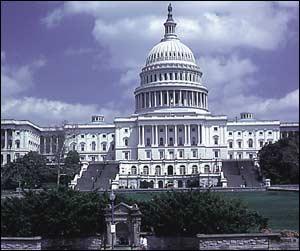Earlier this year we noted here that the Republican-controlled House of Representatives had enacted two pro-medical marijuana amendments. One of them, the long-fought for Hinchey-Rohrabacher amendment, bars the US Dept. of Justice (parent agency of the DEA) from using taxpayer funds from interfering with state medical marijuana laws. The other allows banks to accept deposits from marijuana businesses in states where it is legal (any type of state legality, not just medical).

What will this mean on the ground? It should mean that DEA and other branches of the Dept. of Justice can no longer threaten medical marijuana providers (or more theoretically, patients) with arrest or prosecution, and that landlords should no longer face the threat of asset forfeiture for property being rented to medical marijuana businesses. But the precise language, which focuses on states' implementating medical marijuana systems, could be argued as applying more narrowly, giving reassurance to state officials about their participation but not going further. Another concern is that a prosecutor could argue, for example, that a given marijuana business is not operating in strict accordance with a state's law. Our perspective in the movement is that that determination should be up to state authorities, not federal, but that's not necessarily the perspective of federal law enforcement. Those are some reasons why it remains to be seen just how thoroughly and reliably the protections that the new law provides will turn out to be, and these questions are being debated right now.
Where there's the most pessimism is about whether the new law will halt medical marijuana prosecutions that are already underway, but we'll see. In the past the administration has allowed such prosecutions to continue, but the administration's stance on marijuana policy, criminal justice in general, and their willingness to take concrete actions, has markedly increased during the last two years, so perhaps there is hope.
The CRomnibus also includes language barring the District of Columbia from enacting marijuana reform legislation. On its face that would seem to block Initiative 71 from going into effect, the measure passed by nearly 70% of voters that legalizes possession and home growing of marijuana in the District. But that also isn't clear. Advocates have pointed out that the language doesn't explicitly block Initiative 71, which normally is the action that Congress is required to take if it doesn't want DC legislation to go forward. Because DC has already enacted the measure, and because it only removes penalties and doesn't have a regulatory component (which DC initiatives can't have), that will hopefully mean that the law can change in January after the Congressional review period expires, assuming Congress doesn't take another vote to explicitly block it. One question may be whether transmitting the measure to Congress, as the process requires, would count as an expenditure of funds as defined in the language (though I haven't seen anyone else bring that up yet). According to several Democratic representatives including minority leader Nancy Pelosi, Congress's legislative intent was to allow the initiative to become law, but only to block a bill advanced by a committee of the DC City Council last month to establish a regulatory and taxation system with marijuana stores in the District.
Along with that gray lining, it should be noted that the banking issue, which as far as I can tell is unaddressed by the CRomnibus, is a really huge problem for the marijuana industry. Some consider it an even bigger problem than prosecutions. An attempt by the administration in February to establish safe harbor procedures for banks to take marijuana money has elicited only extremely slight movement on the part of banks, who mostly want to see clarity in federal statutes, not just a policy. So there is a pressing need to pass that second of the House's pro-medical marijuana amendments too.
Still, we have seen an amazing and historic victory this weekend. Whatever the legislation does or doesn't achieve in concrete help for medical marijuana defendants, businesses and patients right now, it clearly eases the way for further legislative progress on the issue. Mostly I think it will depend on whether the new Congress is able to do business at all. If they can, I will not be surprised to see even the Republican-controlled House and Senate to pass banking. And I expect to see bills to fully move medical marijuana into the realm of legality to see substantially increased support from both sides of the aisle.
This work by StoptheDrugWar.org is licensed under Creative Commons Attribution-ShareAlike 4.0 International
Add new comment